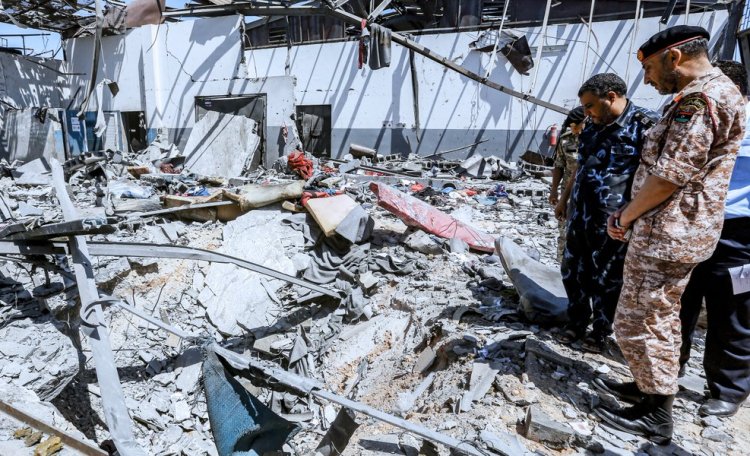Escalation of fighting in Libya would lead to humanitarian consequences: UN official
An early April offensive launched by forces loyal to the LNA against the UN-recognized Government of National Accord (GNA) in Tripoli triggered the recent spasms of violence.

- Country:
- Libya
A recent resurgence of violence in Tripoli, means Libya is “ever more in a race against time” to reach peace, however, agreeing on the way forward to ending the conflict “is a realistic prospect”, the top UN official in the country told the Security Council on Monday.
“Seven and a half months into the conflict in Libya, and given the recent dangerous escalation in hostilities in and around Tripoli, we find ourselves ever more in a race against time to reach a peaceful solution that would spare many lives”, Ghassan Salamé, Special Representative and head of the UN Mission in Libya (UNSMIL) told Council Members during a briefing.
Speaking via videoconference from the Libyan capital, he said he was “angry and sad” by another mass civilian casualty event that took place the same morning against a local biscuit factory, in which 35 were reportedly injured, and 10 killed in an airstrike attack, yet to be classified as deliberate or indiscriminate.
The past few days have been characterized by incidents like this one, with many families abandoning areas impacted by the shelling, Mr. Salamé said, adding that any further escalation of fighting in Tripoli’s densely-populated areas “would lead to disastrous humanitarian consequences.”
Thousands of people have been killed in sporadic fighting since 2014, between factions of the self-styled Libyan National Army (LNA) commanded by Khalifa Haftar, based in the country’s east, and the Tripoli-based internationally-recognized government of Prime Minister Faiez Serraj, following the overthrow of President Muammar Gaddafi three years prior.
An early April offensive launched by forces loyal to the LNA against the UN-recognized Government of National Accord (GNA) in Tripoli triggered the recent spasms of violence. The offensive reportedly quickly stalled, and both sides have drawn on international support to carry out airstrikes, despite last week’s call by the United States for the LNA to halt attacks.
The “dangers and direct consequences of foreign interference are increasingly evident” Mr. Salamé highlighted. To fill manpower gaps, “there is growing involvement of mercenaries and fighters from foreign private military companies” with a greater experience that has amplified the scale of the clashes.
Outside interference fueling fighting
Spare parts for fighter aircraft, tanks, bullets, and precision missiles are being shipped into the country to propel rival party supporters in their fighting, the Special Representative explained, along with a plethora of Gaddafi-era arms which breach a UN arms embargo in the country.
Mitiga Airport, a key outlet for the civilians of Tripoli and Western Libya, has been closed for more than two and a half months due to shelling and airstrikes.
Mr.Salamé said he is working the government’s Ministers of Interior and Transportation to see the airport reopens, in addition to pursuing Second and Third Steps of a three-step peace initiative he presented during his briefing to the Council in July.
In addition, UNSMIL has engaged in extensive outreach to Libyan constituencies, participating in meetings involving commanders of units engaged in fighting, civilian representatives, and political constituencies. The Mission has also hosted local mediations and efforts to address polarization in the country through workshops on hateful rhetoric and mediated dialogue between different members of society.
Hazards to healthcare
Tripoli’s renewed crisis has killed more than 200 civilians, and forced more than 128,000 to flee their homes in the last seven months, the Special Representative noted, and more than 135,000 remain on the frontlines, with an additional 270,000 living in areas directly affected by clashes. In addition, there has been an obvious trend in attacks against public service areas.
We have observed a clear pattern of precision airstrikes against medical facilities and personnel, willful killing or harming of sick or wounded people” which may constitute war crimes, he said.
With 60 attacks against health care facilities, medical personnel and ambulances registered since the beginning of the year, nearly a quarter of all health centers have shut down due to the conflict, electrical or structural damage, resulting in a sharp increase in unmet health needs.
Serious concerns also continue with regard to migrants and refugees, vulnerable to unlawful killings, torture, and other ill-treatment and unlawful deprivation of basic human rights, he continued.
Peace, ‘a realistic prospect’
For it’s part, the UN and humanitarian partners have reached over 310,000 people in need of assistance in 2019, through food deliveries, shelter support, protection services, and others, however, “the needs exceed the means at our disposal” Mr. Salamé said, with the $202 million response plan less than half funded.
“It is somewhat of a cliche to say that the weeks ahead are critical - but once again, it is true for Libya”, Mr.Salamé said, concluding his briefing.
Condemning external investment in the conflict, he said involvement by international actors risks surpassing that of Libya on its own, “taking control of Libya’s future away from Libyans, and putting it in the hands of foreign parties.”
“The parties are known. The outlines of the agreement are known. Options for a temporary or longer-term constitutional framework exist. Electoral legislation has been produced before. It is all eminently possible” to stop the fighting, he stressed.
“Ending the conflict and agreeing to the way forward is a realistic prospect. The United Nations is in Libya, and will remain in Libya, to support the Libyan people in their journey”, he maintained.
ALSO READ
Myanmar fighters target military in drone attacks on capital, anti-junta groups say
Houthi leader: 37 killed in 424 airstrikes conducted by US and UK on Yemen in around 3 months
World News in Brief: $12 million for Haiti, Ukraine airstrikes condemned, support mine action
Israel closes schools, educational systems in wake of Iran's airstrikes
Israeli airstrikes pound Hamas terror sites










